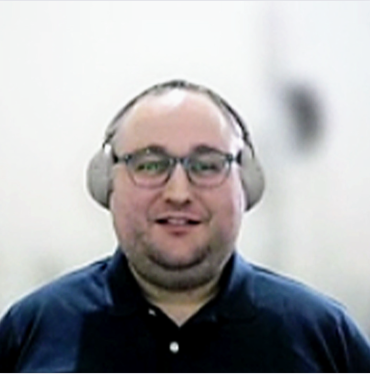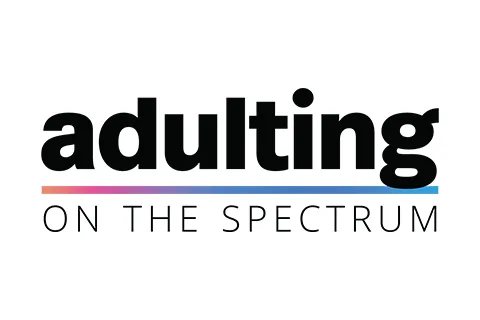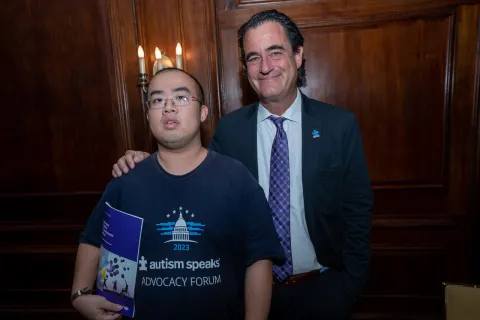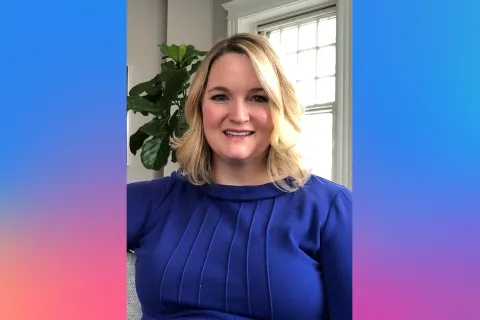Finding job fulfillment after diagnosis: Lessons from Autism Speaks John Taylor
John Taylor is a 38-year-old autistic man who has worked at Autism Speaks since 2011. Reporting directly to a vice president, he is responsible for editing our Resource Guide, contributing to our Tool Kits and Roadmaps, and helping constituents access that information. His path to full-time employment started out bumpy, taking a turn for the better after he received his diagnosis at the age of 24. With a better sense of self he found support from a disability employment agency which ultimately led him to his current role.
Here, John reflects on how he overcame obstacles, shares challenges he still has and offers advice to other autistic adults looking for fulfillment in the workplace. In doing so, he also offers valuable perspective to employers looking to hire autistic adults.
Job Searching: Know yourself and ask for help
A few things caused me difficulties when looking for a full-time job. For one, I was looking for an entry-level job. The catch-22 that many jobseekers face, whether they’re autistic or not, is that so many so-called “entry-level” job ads state a minimal number of years of experience is required. But, you can’t get that experience. All the other job ads have the same requirements. Job openings for those without experience exist, but it takes a lot more effort to find them. Or, you have to have connections to find them. As they say, “It’s not what you know, it’s who you know.”
After my autism diagnosis, I got help from a New-York-City-based organization, Job Path, that helps people with developmental disabilities find jobs. I had a very competent job coach there who helped me pinpoint my skills, prepare my resume, and practice for my interviews.
...In our society, many think that you must make eye contact when communicating with people. People who don’t make eye contact are also seen as not being honest. Silly neurotypicals, am I right? I’m sure they talk on the phone without eye contact just fine!
Interviewing: Challenges and nerves are normal
Once I found entry-level jobs, my difficulties didn’t stop there. I often have trouble making eye contact, especially when I’m physically close to someone, like across their desk during an interview. I also often find it so much easier to concentrate during a conversation without eye contact. By that, I mean focusing on both what I’m saying and what the other person(s) is/are saying. After all, we speak with our mouths, listen with our ears, see with our eyes, and think with our brains. While eyes can convey emotions, they don’t do the actual physical speaking and listening. However, in our society, many think that you must make eye contact when communicating with people. People who don’t make eye contact are also seen as not being honest. Silly neurotypicals, am I right? I’m sure they talk on the phone without eye contact just fine! I’m also certain that eye contact has no bearing on honesty.
Another thing is my body language. I’ve always been very fidgety, especially when feeling nervous. But who doesn’t feel nervous during a job interview? Besides, it is more unnatural to sit completely still for a long conversation than it is to fidget.
I’ve heard other autistic people say that they would prefer to have an alternative to the traditional interview process, like maybe being able to demonstrate their abilities with some sort of test. While I think these options should be open, not only to those with autism, but to everyone, I’m not totally against traditional interviews. I just think interviewers need to be more understanding of people’s differences.
Working full-time: Be good at what you do
Being autistic myself, I feel very connected to the goals of the organization in helping people with autism and their families. It’s very motivating to know that I’m making a difference. The people I work with are all highly motivated in what they do and that’s very energizing.
Another reason I like my job is that if fits my strengths. Editing our Resource Guide requires adding new listings and correcting existing ones. That information includes things like the provider’s name, website, location, contact info, and the services they provide. Usually, I do those things by checking the provider’s website and making sure that what we have in our Resource Guide matches. Sometimes, I have to email the provider if something is unclear. Other times, the providers themselves email us with their updates. I am good at being detail-oriented.
A pair of noise-cancelling headphones is well-worth the investment if you have sound sensitivities. You can either listen to stuff with them on, or you can just use the noise-cancelling feature by itself.
Self-advocating: Tips on how to find a job and thrive in the workplace
- Ask for help. Use an employment agency and/or a job coach that specializes in helping those with disabilities. Job Path’s services extended beyond helping me get a job. They check in with their clients periodically beyond job placement. This is very beneficial.
- Practice answering common job interview questions like, “What are your strengths and weaknesses?” to help you calm down before an interview. This can be with your job coach, a friend, or a family member. Remember though, being nervous is normal.
- Ask for accommodations as soon as you know you need them. I personally find it a lot easier to focus on my work, and not be distracted by things like conversations, by using noise-cancelling headphones to listen to things like music, podcasts, or audiobooks. A pair of noise-cancelling headphones is well-worth the investment if you have sound sensitivities. You can either listen to stuff with them on, or you can just use the noise-cancelling feature by itself. Keep in mind that not all accommodations are appropriate for all work environments. I only occasionally have to speak with coworkers, so listening to stuff on my headphones works for me.
- Many of us thrive on routines. Conversely, we also have trouble with changes in routine. A new job itself is a change in routine. Whatever you used to do during your work hours will probably have to change. Figuring out the best routine could take a bit of trial and error. As you progress in a job, you will probably be given more responsibilities. When this happens, you will have to change your routine. This, once again, is difficult. I think it’s a good idea to tell your supervisor how beneficial routines are for you and to ask for time adjusting to any changes to them.
- Schedule periodic check-ins with your supervisor to stay on the same page. I meet once a week with my supervisor because that works for us. Maybe you would want to meet every day or every month, whatever works for your arrangement. Even if it is not the most fun part of your job, it helps you stay on the same page.









